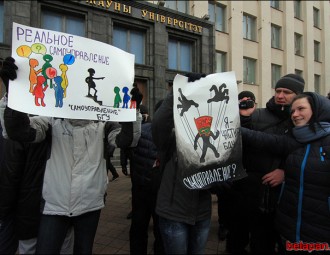EuroBelarus: It is necessary for the public to raise its voice to mobilize the educational reforms in Belarus.
This year, the period of the implementation of the Road map requirements is coming to an end. Over the year and a half we have not fulfilled almost a single step. Uladzimir Dunaeu, a member of the public Bologna committee had a talk with "EuroBelarus" Information Service about what is happening on the way to the Bologna process.
- What results have been achieved in reforming the higher education system in Belarus over the past year?
- There are two plans of theprocess of Belarus integrating into the European higher education space. The first one is to enshrine certain norms of the EHEA in Belarusian legislation, and this process is regulated by the obligations under the Road map agreement, which Belarus signed in 2015. The second one is the academic practice, which takes the values and norms of the Bologna process into account.
According to our experts, the level of implementation of the Road map is about 9%. This is very low, and there is only one year left to complete the process. In the past year a new version of the Education Code was being developed, and we hoped that it will be adjusted to the requirements of the Roadmap. But, judging by the information we have, there are no reasons for optimism.
As for the academic life, it should be noted that at the end of the year the Ministry of Education began to demonstrate greater openness and willingness to discuss the changes.
- How was it manifested?
-There was a very productive round table in October. During the meeting minister Zhuraukou publicly stated that the Belarusian higher education has no other future except in the Bologna process. Such openness and self-criticism was the ground for some positive expectations. Unfortunately, they changed to doubts related to the appointment of a new minister who has neither academic background nor experience. On the other hand, it is too early to call it a conservative revenge, which will block the modernization of higher education in Belarus.
- However, the new year began with certain reforms: a few days ago the changes in the admission to the institutions of higher and secondary special education were released. What does it mean?
- This reforms were planned long ago. The changes correspond with such a democratic value as the higher education accessibility. But these steps do not contribute to the quality of education.
It is necessary to pay attention to the problem of the distribution of students. This December a decree of the Council of Ministers was issued. It slightly changed the order of exemption from the labor slavery, which distribution is, it became a little bit cheaper, by 20%. This is hardly a major reform, but, at least, it gives some relief while the distribution mechanism does not work anymore and becomes the ultimate form of hypocrisy.
- How can this be related to the last, crucial year of Road map implementation?
- Judging by what's going on, the Road Map might be implementated by 20% at most.
Today the Belarusian authorities and our European partners must raise the question of what to do in the circumstances of chronic non-compliance. This damages the reputation of Belarus.
- What are the plans of the Public Bologna Committee for this year?
- We will continue to monitor the situation. There is an international Bologna working group to prepare a report on the implementation of the Road Map obligations by Belarus. Political decisions will be formally made at the Global Education Industry Summit in Paris, May 2018.
- How can the society influence the situation?
- Society is people who take interest in the process. But since they can’t get access to the data, their opinions are not taken into account. Employers are silent, students are intimidated by repressions, the parents generally do not understand what is happening. Civil society is trying to do something, but it’s not enough for the process to be productive.



